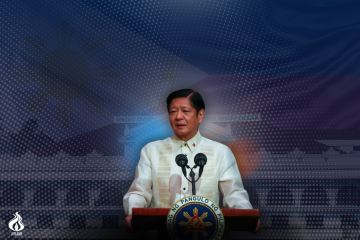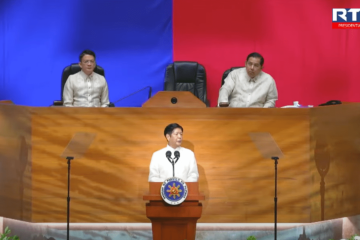
SKILLED WRITERS should not fear generative artificial intelligence (GenAI) as it only poses a threat to those who settle for mediocrity and complacency, a veteran broadcast journalist said.
Broadcast journalist and TV 5 anchor Ed Lingao said the GenAI platform ChatGPT is “not an excellent writer” but a tool capable of conversing and writing with “excellent mediocrity.”
“If you are a good writer, there’s nothing to worry about. If you are a mediocre writer, then you should worry because you are no different from ChatGPT,” he told campus journalists during the 2024 Inkblots on Thursday, Jan. 11.
Lingao explained that ChatGPT and other large language model-based artificial intelligence (AI) tools have outperformed human writers due to their better grammar, sentence construction, syntax and faster data processing.
Lingao noted that AI was initially used only in back-office operations, such as transcribing, subtitling, boosting search engine optimization rankings and other types of analysis. But the rise of GenAI chatbots in recent years has challenged the place of journalists as writers, he added.
“By the end of 2022, we were discovering that, unfortunately, machines were writing better than many humans. If machines were writing with excellent mediocrity, how come they write better than humans? [Perhaps that means] we lost the skill of writing,” Lingao said, adding that several of his fellow professors and editors shared the same idea.
“Somewhere along the way, we have lost what defines us, writers…ChatGPT and other bots are now writing better than many of us,” he added.
However, the broadcast journalist pointed out that despite its superiority in language, AI does not have the capability to distinguish between fact and fiction, making it dangerous when misused in newsrooms and classrooms.
Kara David-Cancio, award-winning documentarist and chairperson of the University of the Philippines’ journalism department, stressed that AI and other technologies are meaningless without a well-written story. She said the technology should only enhance media practitioners’ jobs.
“Facebook, Instagram, Twitter, TikTok, using artificial intelligence, whatever platform or editing software you use, these are just tools. They are just platforms and they are nothing if you don’t have a story. If you have a bad story, you have a bad story,” David, who hosts three programs of GMA 7, said.
“Artificial intelligence is just a tool to enhance our jobs as media people, but it can never replace the story,” she added.
Philippine Daily Inquirer sports editor Francis Ochoa shared similar sentiments, saying that while AI chatbots are able to generate information, they are not capable of conducting interviews and on-the-ground work.
“AI can answer a lot of questions…it just cannot ask those questions by itself. We have to be the ones to do that,” he said.
Ochoa urged students and reporters to hold on to their curiosity and seek the “human aspect” of journalism, which refers to interviews, observations and other types of fieldwork.
“AI is always obedient…It will do what you want it to do, but it’s never curious. That’s what we are that it can never be,” he added.
Meanwhile, seasoned editorial writer and Rappler columnist John Nery said AI should prod journalists to be “a step ahead” in terms of their writing.
“I think once we recognize that the machines are ready to write better than us, we need to be able to adjust our writing… We need to stay a step ahead of the machines that are copying us,” he said.
Nery also emphasized the need for the journalism profession to reassess its perspective on AI, stressing the importance of industry-wide discussions about its opportunities and risks.
“We need more conversations. We need not necessarily one common action, but we need to think as a collective about what is happening [and] the opportunities and risks posed by AI,” the columnist said.
Organized by The Varsitarian, the 25th Inkblots carried the theme, “Innovating Campus Journalism in the Age of AI.”
The two-day conference, held from Jan. 11 to 12 at the Dr. Robert Sy Grand Ballroom in the Buenaventura Garcia Paredes O.P. building, was attended by about 300 campus journalists nationwide. F – Katherine Chan and Ma. Alyanna Selda



